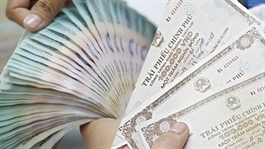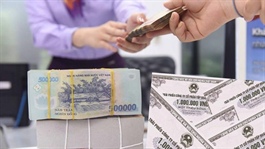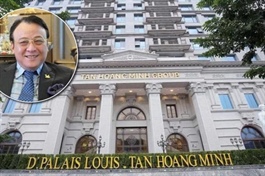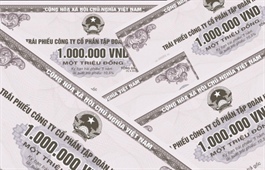Leaders eye bond market revamp
Leaders eye bond market revamp
The recent cancellation of new corporate bonds has sparked a public discussion about the dissemination of misleading information and the multiple hazards lurking in the debt market. Investors, on the other hand, are concerned about an appropriate solution to this conundrum.
Deputy Prime Minister Le Minh Khai last week signed and promulgated Public Notice No.304 on the rectification of corporate bond market activities and land auctions, after acknowledgement that numerous hazards and illegal manipulations have been impeding investors’ faith.
The decision came hot on the heels of the State Securities Commission’s (SSC) decision to cancel nine bond issuances by real estate developer Tan Hoang Minh Group between July 2021 and last month, totalling $436.1 million, owing to concealment and dissemination of misleading information.
The DPM also cautioned that lingering risks from the private placement of bonds by real estate companies with huge issue volumes and high-interest rates should be taken into account.
The Ministry of Finance (MoF) and the State Bank of Vietnam (SBV) thoroughly monitor the financial and monetary market developments, including the issuance, investment, distribution, transaction, and use of corporate bond capital to guarantee compliance with current legal restrictions.
The Ministry of Natural Resources and Environment is also required to study and enhance the inspection of conducting auctions of land use rights.
A total of eight lots with a total value of $353.5 million released in 2021 have been declared by the Hanoi Stock Exchange, out of nine cancelled bond issuances by Tan Hoang Minh. Information on one issuance has not yet been released.
The unprecedented cancellation of the Tan Hoang Minh private bond issuance has caused an uproar in the market. The cancellation occurred after the bidding process to buy a land lot in Ho Chi Minh City’s Thu Thiem Peninsula for a record $106,521 per square metre late last year. The company soon thereafter decided to pull out of the transaction in January, forfeiting millions of dollars in deposit money.
SSI analyst Trinh Thai stated, “Some are concerned that Tan Hoang Minh might face default risk from the scandal, which could trigger a domino effect in the property sector as seen with Evergrande in China. We might need to wait for the response by Tan Hoang Minh to see how it could resolve its obligation balance to pay off debt holders in the event claims from investors come due.”
In terms of systemic impact, she added, Tan Hoang Minh has a smaller foothold in the property sector overall, which means if a domino effect were to ripple into the market, it would likely be limited in scale.
“However, we might expect the corporate bond market to be muted given the regulatory crackdown on market misconduct which has ramped up since last year, as well as the government’s tightening of legal requirements and loopholes,” Thai said.
On the flip side, bondholders are concerned about whether their investment money will be lost and, if so, how they will recover their funds from the cancellation.
The relevant state bodies would compel Tan Hoang Minh to repurchase bonds. But Tan Hoang Minh may not be able to purchase all nine cancelled bond lots immediately.
Tran Minh Hai, director of law firm BASICO, referenced Decree No.128/2021/ND-CP dated December 30 on sanctioning administrative violations in the securities market, stating that individual investors have the right to obtain money back to acquire bonds and claim reimbursement from the issuer.
“The demand for compensation for damage must be made to the issuing firm within 60 days from the date of the SSC’s handling decision on the cancellation of issued bond lots,” Hai said.
In this specific instance, he argued that bondholders have not comprehended well enough the financial capability, business strategy, and collateral of the issuers. Therefore, when firms fail to fulfil their obligations, bondholders encounter various challenges.
“In the meantime, investors need to promptly disclose information to the business side and urge them to refund the money. Depending on the progress of the case, there will be further measures to collect the money back,” he said.
Truong Thanh Duc, general director of ANVI law consultancy, further remarked that if Tan Hoang Minh cannot buy back all nine bonds cancelled because money has been poured into other projects, it would be extremely difficult to handle. “Relevant parties have to go to court to continue to complete the cases,” he said.
Outstanding corporate bonds as of 2021 are estimated to be around $60.8 billion, implying a compound annual growth rate of 46 per cent between 2017 and 2021. The figure made up around 11.4 per cent of the total credit outstanding of the whole economy and 14.5 per cent of GDP last year.
“The market size of corporate bonds in Vietnam has increased by leaps and bounds in just a few short years,” Thai of SSI highlighted. “Clearly, Hanoi is not bluffing when it comes to establishing efficiency in both regulations and enforcement in the market. We see this bellwether change as a welcome pivot towards a more fair-play environment for raising capital, and to ultimately build more financially sustainable giants that can go toe to toe with its regional and international peers.”






















